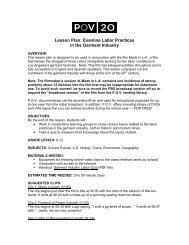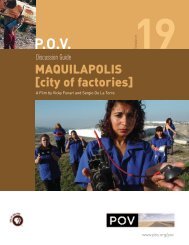economic empowerment - PBS
economic empowerment - PBS
economic empowerment - PBS
- No tags were found...
Create successful ePaper yourself
Turn your PDF publications into a flip-book with our unique Google optimized e-Paper software.
Economic EmpowermentWomen play a vital role in the <strong>economic</strong> prosperity of their families, communities, andcountries, yet in every part of the world, women work longer hours than men, are paidless for their work, are at a higher risk of unemployment, and are far more likely to live inpoverty.“If we empower women we empowersociety. There is a direct correlation.We are not just changing a life, we arechanging a community.”–Roshaneh Zafar, Founder and managingdirector of the Kashf FoundationFast Facts• Approximately 70 percent of the world’s poor are women and girls.• Women earn less than 10 percent of the world’s wages, but do more than two-thirds ofthe world’s work.• Women reinvest 90 percent of their income into their families, while men invest only 30 to40 percent. In Brazil, when income is in the hands of the mother, the survival probabilityof a child increases by about 20 percent.• According to a report by the World Economic Forum, the United States ranks 19th in theworld in the area of <strong>economic</strong> participation for women and 46th in the area of <strong>economic</strong>opportunity.• It is estimated that if women’s paid employment rates were increased to the same levelas men’s, the U.S. gross domestic product (GDP) would be 9 percent higher; the euroarea’s would be 13 percent higher, and Japan’s would be 16 percent higher.• Where women are better represented in national government, they also tend to be betterrepresented in top administrative positions as well as in the labor force at large.• Women remain severely underrepresented in occupations that are traditionally maledominated(e.g., formal professions, skilled labor, civil service positions) even thoughthese jobs pay 20 to 30 percent more than traditionally female jobs (e.g., caretaking,textile and garment work, retail, food preparation).• Studies show that when women have secure rights to their land, their families’ nutritionand health improve. In addition, women may be less likely to be victims of domesticviolence and children are more likely to receive an education and stay in school longer.• In sub-Saharan Africa, women own less than 2 percent of the land, but produce morethan 90 percent of the food.• In developing countries, women and girls are most often responsible for household andcommunity water management and travel great distances in search of water, which limitstheir time for other activities, including doing income-generating work.• South African women collectively walk the equivalent of a trip to the moon (384,400kilometers or 238,855 miles) and back 16 times a day to supply their householdswith water.• Economically empowered women tend to have fewer children.• In one out of three households around the world, women are the sole breadwinners.• Each additional year in school raises a woman’s earnings by about 15 percent.Discussion guide // <strong>economic</strong> <strong>empowerment</strong>11
















